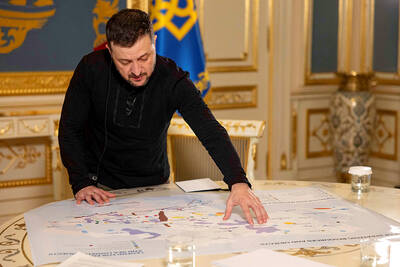Persian Gulf nations must demand that Iran come clean about its past nuclear ambitions and openly vow to not develop such weapons in the future, US Defense Secretary Robert Gates said yesterday.
In a broad call to diplomatic arms, Gates exhorted leaders from the Gulf to band together to force Iran to stop its uranium enrichment program and to help the fragile Iraqi government.
"Everywhere you turn, it is the policy of Iran to foment instability and chaos, no matter the strategic value or cost in the blood of innocents -- Christians, Jews and Muslims alike," Gates said in a keynote address at an international security conference. "There can be little doubt that their destabilizing foreign policies are a threat to the interests of the United States, to the interests of every country in the Middle East and to the interests of all countries within the range of the ballistic missiles Iran is developing."
And in a sarcastic riff, he goaded Iran to acknowledge its alleged bad behavior -- from arming terrorists in Iraq to its support for militant organizations like Hezbollah and Hamas.
Asked if the US would be willing to sit down and talk with Iran, Gates said the behavior of the new leadership of Iran "has not given one confidence that a dialogue would be productive."
Noting that Iran embraced the recent US intelligence estimate that concluded it had actually stopped atomic weapons development in 2003, Gates said Iran should accept that all other intelligence conclusions about its conduct are true. When the report came out earlier this week, Iranian President Mahmoud Ahmadinejad hailed it as a "declaration of victory" for his country.
"In reality, you cannot pick and choose only the conclusions you like of this National Intelligence Estimate," Gates said. "Since that government now acknowledges the quality of American intelligence assessments, I assume that it also will embrace as valid American intelligence assessments of its funding and training of militia groups in Iraq."
Gates said Iran should also acknowledge it delivers weapons to terrorists in Iraq and Afghanistan, supports terror groups and continues to develop ballistic missiles that could be used to carry weapons of mass destruction.
Gates' rebukes didn't reach any Iranian ears directly, since Iran decided at the last moment not to attend the gathering, organized by the London-based International Institute for Strategic Studies.
Gates' speech followed efforts by US Secretary of State Condoleezza Rice to press for new sanctions against Iran.
Rice asserted on Friday in Brussels that Washington would continue pressing for new sanctions against Iran while holding talks to convince Tehran to come clean about its nuclear program.
But Russia ignored her calls to punish Iran. Despite continued support from NATO and other European allies, Rice was unable to convince Russian Foreign Minister Sergey Lavrov that fresh sanctions were urgently needed.
Rice said her talks with Lavrov were "an extension of other conversations we have had," suggesting the two didn't see eye to eye.

Thousands gathered across New Zealand yesterday to celebrate the signing of the country’s founding document and some called for an end to government policies that critics say erode the rights promised to the indigenous Maori population. As the sun rose on the dawn service at Waitangi where the Treaty of Waitangi was first signed between the British Crown and Maori chiefs in 1840, some community leaders called on the government to honor promises made 185 years ago. The call was repeated at peaceful rallies that drew several hundred people later in the day. “This government is attacking tangata whenua [indigenous people] on all

RIGHTS FEARS: A protester said Beijing would use the embassy to catch and send Hong Kongers to China, while a lawmaker said Chinese agents had threatened Britons Hundreds of demonstrators on Saturday protested at a site earmarked for Beijing’s controversial new embassy in London over human rights and security concerns. The new embassy — if approved by the British government — would be the “biggest Chinese embassy in Europe,” one lawmaker said earlier. Protester Iona Boswell, a 40-year-old social worker, said there was “no need for a mega embassy here” and that she believed it would be used to facilitate the “harassment of dissidents.” China has for several years been trying to relocate its embassy, currently in the British capital’s upmarket Marylebone district, to the sprawling historic site in the

‘IMPOSSIBLE’: The authors of the study, which was published in an environment journal, said that the findings appeared grim, but that honesty is necessary for change Holding long-term global warming to 2°C — the fallback target of the Paris climate accord — is now “impossible,” according to a new analysis published by leading scientists. Led by renowned climatologist James Hansen, the paper appears in the journal Environment: Science and Policy for Sustainable Development and concludes that Earth’s climate is more sensitive to rising greenhouse gas emissions than previously thought. Compounding the crisis, Hansen and colleagues argued, is a recent decline in sunlight-blocking aerosol pollution from the shipping industry, which had been mitigating some of the warming. An ambitious climate change scenario outlined by the UN’s climate

BACK TO BATTLE: North Korean soldiers have returned to the front lines in Russia’s Kursk region after earlier reports that Moscow had withdrawn them following heavy losses Ukrainian President Volodymyr Zelenskiy on Friday pored over a once-classified map of vast deposits of rare earths and other critical minerals as part of a push to appeal to US President Donald Trump’s penchant for a deal. The US president, whose administration is pressing for a rapid end to Ukraine’s war with Russia, on Monday said he wanted Ukraine to supply the US with rare earths and other minerals in return for financially supporting its war effort. “If we are talking about a deal, then let’s do a deal, we are only for it,” Zelenskiy said, emphasizing Ukraine’s need for security guarantees